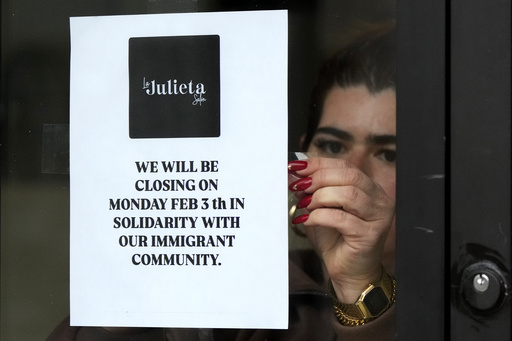
Across the United States, a range of businesses, including day cares, grocery stores, and hair salons, closed their doors on Monday as part of a loosely coordinated “day without immigrants” protest against President Trump’s immigration policies. However, many employees and business owners expressed reluctance to participate, primarily due to the financial implications of missing work. The climate of fear stemming from rumors of potential immigration raids—many of which were unfounded—left numerous immigrant communities hesitant to step outside, impacting even attendance in some schools. This protest followed a series of street demonstrations that took place on Sunday in California and other locations.
Noel Xavier, the organizing director for the North Atlantic States Regional Council of Carpenters, emphasized the importance of reminding society about the contributions of migrant workers to their communities. Nevertheless, he acknowledged that many workers could not afford to take the day off. “If I don’t go to work today, that’s one less day I have to cover my rent,” he shared, highlighting the financial strain faced by workers in similar situations. He commented that there didn’t seem to be a strong collective movement toward taking time off, as many felt they lacked the luxury to do so.
Jaime di Paulo, president of the Illinois Hispanic Chamber of Commerce, observed that while small eateries and retailers in Chicago’s predominant Latino areas joined the protest, larger employers in construction and other industries remained fully operational. “This is only hurting our own community,” he remarked, reflecting concerns about the economic repercussions of the protest.
In Chicago’s Pilsen district, Andrea Toro chose to close her hair salon for the day, noting that many of her clients are teachers whose students have been frequently absent since Trump’s administration began. The anxiety surrounding safety has led families to keep children home, with some school districts acknowledging participation in the protest by families. “If we don’t have immigrants, we don’t have much of anything around here,” Toro stated, emphasizing the necessity of immigrant contributions to the workforce.
El Burrito Mercado, which has transformed from a small Latino market to a prominent restaurant and grocery entity in St. Paul, Minnesota, had previously closed for a similar event in 2017. However, on Monday, it operated with a limited staff. Co-owner Milissa Silva explained that many employees, whose families emigrated from Mexico, were apprehensive about losing a day’s income and the impact it would have on the community’s access to groceries.
Meanwhile, Tierra Encantada, a Spanish-immersion daycare provider, chose to keep its 14 locations open. Despite this, many parents opted to keep their children at home to show solidarity with the predominantly immigrant workforce. CEO Kristen Denzer reported that around 450 children, or 70% of those enrolled in Minnesota’s centers, were absent that day. This prompted several undecided staff members to participate after witnessing the support from families.
In Utah, several Latino-owned establishments also locked their doors in solidarity. State Senator Luz Escamilla, who is a Democrat and Senate minority leader, commented that the day’s events were intended to promote compassion and raise awareness about the fears permeating communities. When asked about the protest, Utah Senate President Stuart Adams, a Republican, defended the administration’s immigration stance, asserting that law-abiding immigrants have nothing to fear. He insisted that only those with criminal backgrounds or serious legal issues face deportation threats.
As immigration enforcement continues to seek out individuals viewed as public safety or national security threats, a significant shift under the Biden administration permits officers to arrest undocumented individuals encountered during enforcement activities. This underscores the ongoing complexities and challenges faced by immigrant communities across the nation.

